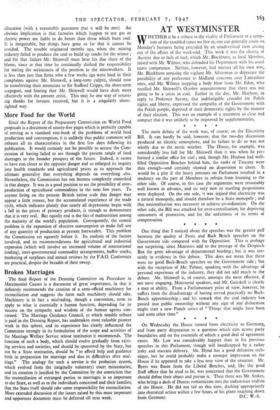AT WESTMINSTER
WHETHER it be a tribute to the vitality of Parliament or a symp- tom of the troubled times we live in, one can generally count on Monday's business being preceded by an unadvertised item arising out of the affairs of the week-end. This week it was the closing of Austins due to lack of fuel, which Mr. Blackburn, as local Member, raised with Mr. Wilmot, who defended his Department with his usual suave competence. Neither, however, had matters all his own way, Mr. Blackburn arousing the vigilant Mr. Silverman to deprecate the possibility of any preference to Midland concerns over Lancashire ones, and Mr. Wilmot stopping a body blow from Mr. Eden, who recalled Mr. Shinwell's October announcement that there was not going to be a crisis in coal. Earlier in the day, Mr. Mayhew, in reply to Professor Savory, that indefatigable crusader for Polish rights and liberty, expressed the sympathy of the Government with the Polish people, deprived of their democratic rights by the manner of their election. This was an example of a statement so clear and compact that it was unlikely to be improved by supplementaries.
* *
The main debate of the week was,, of course, on the Electricity Bill. It can hardly be said, however, that the two-day discussion produced an electric atmosphere, and its failure to do so was not wholly due to the arctic weather. The House, for example, was considerably less full for Mr. Shinwell than it was when he per- formed a similar office for coal ; and, though Mr. Hudson had well- filled Opposition Benches behind him, the ranks of Tuscany were thin enough—and certainly showed no disposition to cheer. It would be a pity .if the heavy pressure on Parliament resulted in a tendency on the part of Members to refrain from listening to the other side. Of course, in this case the arguments were reasonably well known in advance, and no very new or startling propositions were deployed. On the one side, it was argued that electricity was a natural monopoly, and should therefore be a State monopoly ; and that nationalisation was necessary to achieve co-ordination. On the other side, the Bill was attacked for over-centralisation, for depriving consumers of protection, and for the unfairness ot its terms of compensation.
* * * * One thing that I noticed about the speeches was the greater gulf between the quality of Front and Back Bench speeches on the Government side compared with the Opposition. This is perhaps not surprising, since Ministers add to the prestige of the Despatch Box the great advantage of departmental briefing ; but it was cer- tainly in evidence in this debate. This does not mean that there were no good Back-Bench speeches on the Government side ; but with the exception of Mr. Palmer, speaking with the advantage of personal experience of the industry, they did not add much to the debate. Mr. Shinwell is, of course, amongst the most effective, if not most engaging, Ministerial speakers, and Mr. Gaitskell is clearly a man ot ability. From a Parliamentary point of view, however, he suffers from the disadvantage of having served practically no Back- Bench apprenticeship ; and his remark that the coal industry has passed into public ownership without any sign of any dislocation might start a new Punch series of "Things that might have been said some other time."
* * On Wednesday the House turned from electricity to Germany, and from party disputation to a question which cuts across party boundaries and on the essentials of which a good deal of agreement exists. Mr. Law was considerably happier than in his previous speeches in this Parliament, though still handicapped by a rather jerky and staccato delivery. Mr. Hynd has a good defensive tech- nique, but he could probably make a stronger impression on the House if he appeared to take a less rosy view of the situation. Mr. Byers was fluent from the Liberal Benches, and, like the good Staff officer that he used to be, was concerned that the Government should define their object and pursue it. Then there was Mr. Stokes, who brings a dash of Dumas romanticism into the industrious realism of the House. He did not fail us this time, dashing appropriately into rhetorical action within a few hours of his plane touching down


































 Previous page
Previous page